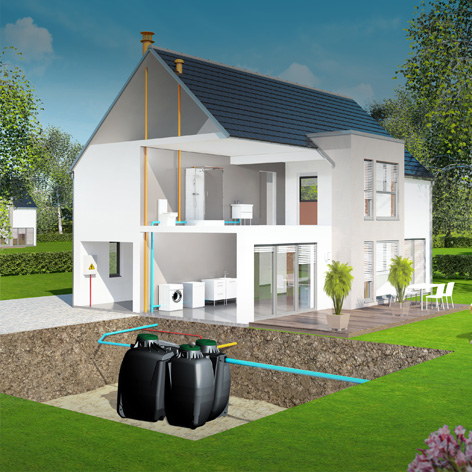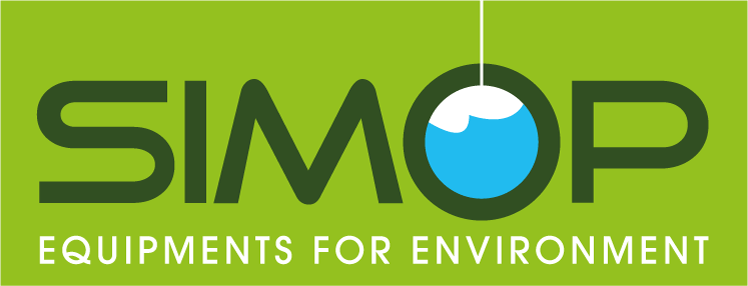Some definitions about waste water
- People equivalent (PE): unit of measurement used to assess the capacity of a wastewater treatment plant. This unit of measurement is based on the quantity of pollution emitted per person per day (European directive of May 21, 1991): BOD5 = 60g, COD = 120g, Volume = 150 liters.
- BOD5: Biochemical Oxygen Demand. It corresponds to the quantity of oxygen required for the biological oxidation and stabilization of organic matter present in wastewater at 20°C and in the dark. Typical values for urban wastewater are between 150 and 500 mg O²/L.
- COD: Chemical Oxygen Demand. This is the quantity of oxygen equivalent to the quantity of K2Cr2O7 required to oxidize the oxidizable matter in the sample to be analyzed. Average values found in urban wastewater are between 300 and 1000 mg O²/L.
- TSS: Suspended Solids. Particles > 1μm in size that can settle. Usual values in urban wastewater are in the order of 200 to 700 mg/L.
- Main room (PP): this concept is used to determine the size of the NCA system required for any room opening to the outside and with a minimum surface area of 8m². Between 8 and 40m² = 1PP ;
40m² = 2PP ;
Between 60 and 80m² = 3PP ;
Beyond 80m² , + 20m²= +1PP
Generally speaking, the number of main rooms corresponds to the Equivalent Dwelling capacity.
The preceding rule does not apply to the following cases, for which a special study must be carried out to justify the dimensioning bases:- Establishments open to the public, for which sizing is based on capacity;
- Single-family homes where the number of main rooms is disproportionate to the number of occupants (sized according to actual needs).
Bylaws

Wastewater treatment is governed by 2 main regulatory texts.
- The order of September 7, 2009 amended in 2012, and the order of July 2015 amended in 2020.
- The 2012 decree concerns systems with a gross input load of less than or equal to 1.2kg BOD5/day. This is the text that governs systems with a sizing of less than 20 Population Equivalents (PE). The second decree concerns facilities with a gross input load of over 1.2kg BOD5/day, i.e. those with a population equivalent of over 20.
Standards
These regulations are supplemented by standard 12566. This series of standards (12566-1 to 12566-6) characterizes products and solutions in terms of mechanical resistance and, for example, the dimensioning of structures for small installations (less than 20 p.e.).
The Document Technique Unifié (D.T.U), 64.1 concerns the installation of so-called traditional systems. It ensures that the work is carried out correctly, depending on the type of soil and the techniques used.
The type of soil and its permeability determine the type of treatment system required.
By convention, soil permeability for sanitation is assessed using the Porchet method.
Compact sanitation systems
Order of September 7, 2009
It lays down the technical specifications applicable to non-collective sanitation facilities receiving a gross organic pollution load of less than or equal to 1.2 kg/d of BOD5.
Article 7 stipulates that :
- Domestic sewage can also be treated by plants equipped with devices approved by notified bodies.
- Microstation and compact filter products fall into this category and are a good alternative to traditional systems where soil or plot space is limited.
Standard 12566-6
Standard 12566-6 allows the use of a treatment unit behind an existing all-water tank, provided it meets a certain number of quality criteria. Bionut has been approved under this chapter of the standard.

Traditional treatment units
Order of September 7, 2009
They are regulated by the September 2009 decree for installations below 50 p.e.. Only article 7 concerns compact filters.
Their installation is governed by DTU 64.1
It ensures that the work is carried out correctly, depending on the type of soil and the techniques used.
In certain cases and under certain conditions, it is authorized to install a system with a reconstituted Zeolite-based bed, for solutions not exceeding 5EH.
Please note: It is forbidden to discharge wastewater into a sump, even if treated.

Grease treatment
Environment Code
The French Environment Code requires the treatment of all types of waste, and in particular bio-waste. Vegetable and animal oils and fats fall into the latter category, and must therefore be taken into account and treated. These fats need to be collected in a suitable system, which will then prevent any disruption to the networks.
What’s more, regional and even local regulations often prohibit the discharge into wastewater of elements likely to harm the environment or public health. Catering professionals are therefore obliged to equip themselves with treatment systems adapted to their activity. Finally, greasy residues and sludge must undergo specific treatment and cannot be spread.
Standard 1825
Grease separators are governed by standard 1825.
Part 1 of the standard sets out the principles governing the design of devices, the tests to which they must be subjected, and their marking.
They are sized according to various criteria:
– The nature of the business ;
– Type of grease to be treated (vegetable, animal) ;
– The presence or absence of detergent in the effluent.
Article 6 of the order of September 7, 2009
A grease trap must be installed in addition to the individual sanitation system, (art. 6 of the 2009 decree) whenever oil or grease could cause harmful deposits. It must be installed as close as possible to the point of emission.




